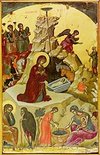Difference between revisions of "Template:Featured"
m |
|||
| Line 4: | Line 4: | ||
</div> | </div> | ||
<!--nb. portrait images at ~100px, landscape images at ~200px--> | <!--nb. portrait images at ~100px, landscape images at ~200px--> | ||
| − | [[Image: | + | [[Image:Nativity.jpg|100px|left]] |
| + | The '''''[[Nativity]] according to the flesh of our Lord, God and Saviour [[Jesus Christ]]''''', also called '''Christmas''', is one of the [[Great Feasts]] of the [[Orthodox Church]], celebrated on [[December 25]]. In the fullness of time, our Lord [[Jesus Christ]] was born to the Holy [[Theotokos]] and Virgin Mary, thus entering into the world as a man and revealing Himself to mankind. | ||
| + | According to the [[Bible]] and to [[Holy Tradition]], Jesus was born in the city of Bethlehem in a cave, surrounded by farm animals and shepherds. The baby Jesus was born into a manger from the [[Theotokos|Virgin Mary]], assisted by her husband St. [[Joseph the Betrothed|Joseph]]. St. Joseph and the Theotokos were forced to travel due to a Roman census; the odd location of the birth was the result of the refusal of a nearby inn to accommodate the expecting couple ([[Gospel of Luke|Luke]] 2:1-20). | ||
| − | '''''Recently featured:''''' [[Alexander Nevsky]], [[Episcopi vagantes]], [[Joseph the Hesychast]], [[Eucharist]], [[Alexander (Nemolovsky) of Brussels]], [[John the Merciful]], [[John (Shahovskoy) of San Francisco]], [[Gabrielia (Papayannis)]], [[Fall of Constantinople | + | Though Jesus' birth is celebrated on December 25, most scholars agree that it is unlikely he was actually born on this date. The choice of December 25 for the Church's celebration of the Nativity is most likely to have been in order to squelch attendance at pagan solstice festivals falling on the same day. |
| + | |||
| + | |||
| + | '''''Recently featured:''''' [[Theological School of Halki]], [[Alexander Nevsky]], [[Episcopi vagantes]], [[Joseph the Hesychast]], [[Eucharist]], [[Alexander (Nemolovsky) of Brussels]], [[John the Merciful]], [[John (Shahovskoy) of San Francisco]], [[Gabrielia (Papayannis)]], [[Fall of Constantinople]]. ''Newly [[:Category:Featured Articles|featured articles]] are presented on '''Saturdays'''.'' | ||
Revision as of 21:46, December 22, 2006
The Nativity according to the flesh of our Lord, God and Saviour Jesus Christ, also called Christmas, is one of the Great Feasts of the Orthodox Church, celebrated on December 25. In the fullness of time, our Lord Jesus Christ was born to the Holy Theotokos and Virgin Mary, thus entering into the world as a man and revealing Himself to mankind.
According to the Bible and to Holy Tradition, Jesus was born in the city of Bethlehem in a cave, surrounded by farm animals and shepherds. The baby Jesus was born into a manger from the Virgin Mary, assisted by her husband St. Joseph. St. Joseph and the Theotokos were forced to travel due to a Roman census; the odd location of the birth was the result of the refusal of a nearby inn to accommodate the expecting couple (Luke 2:1-20).
Though Jesus' birth is celebrated on December 25, most scholars agree that it is unlikely he was actually born on this date. The choice of December 25 for the Church's celebration of the Nativity is most likely to have been in order to squelch attendance at pagan solstice festivals falling on the same day.
Recently featured: Theological School of Halki, Alexander Nevsky, Episcopi vagantes, Joseph the Hesychast, Eucharist, Alexander (Nemolovsky) of Brussels, John the Merciful, John (Shahovskoy) of San Francisco, Gabrielia (Papayannis), Fall of Constantinople. Newly featured articles are presented on Saturdays.
